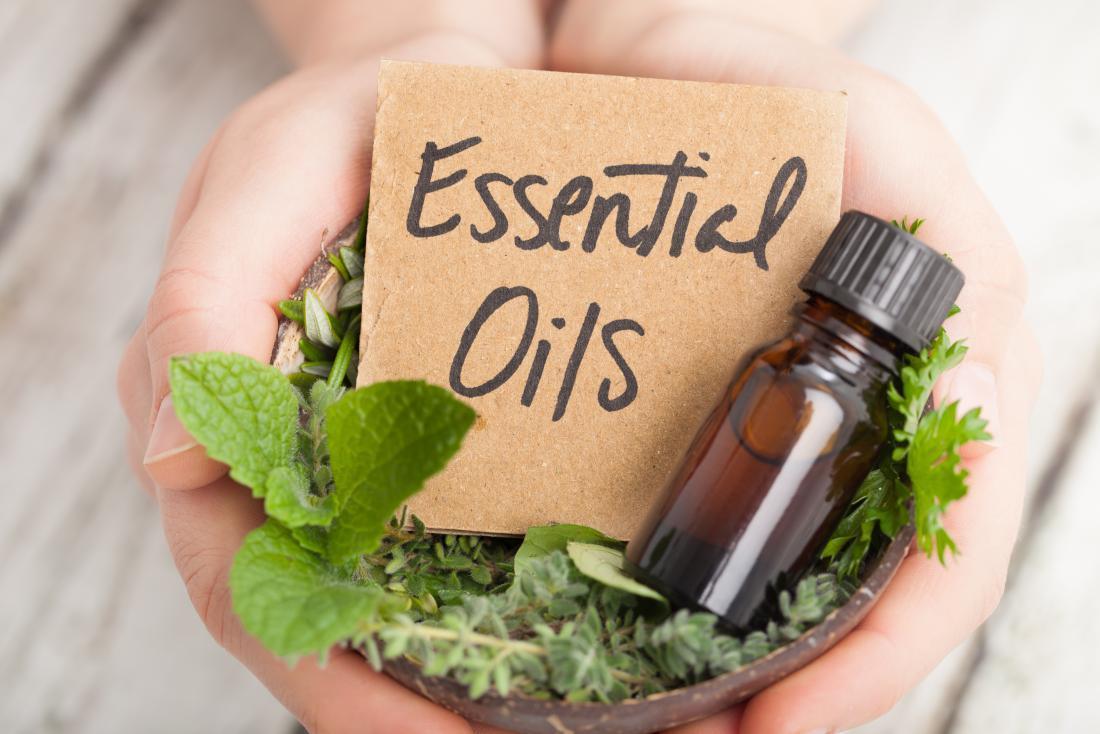
Some essential oils may ease symptoms of a cough or cold by soothing the throat, fighting bacteria, and reducing inflammation.
Research has shown that using a nasal spray containing a blend of eucalyptus, peppermint, oregano, and rosemary extracts can improveTrusted Source a sore throat, hoarseness, and other cough-related symptoms.
In this article, we look at the evidence to support the use of 12 essential oils in treating coughs. We also discuss the best ways to use these oils, risks, and when to see a doctor.

essentials oils in hands
There are many causes for someone to cough, including the common cold, flu, or chest infection. Essential oils may help to soothe the throat, reduce inflammation, and clear away mucus.
The medical community tends to view essential oils as a complementary alternative therapy rather than a medical treatment. These oils should be used with caution, as there are no approved guidelines about dosage or strength.
However, there are instructions, and if a person follows them, any of the 12 essential oils below may help to relieve a cough.
1. Eucalyptus essential oil
Many people use this oil without realizing it. Over-the-counter vapor or chest rubs marketed to suppress coughs often contain eucalyptus oil. Or, they may include the oil’s key compound, called eucalyptol or cineole.
A study published in the Alternative Medicine Review found that eucalyptol has an antimicrobial effectTrusted Source and may fight off bacteria that cause illnesses. Eucalyptol may also help to reduce inflammation, relieve pain, and ease muscle tension that can result from a cold or flu.
Eucalyptus essential oil can be used to calm a cough in several ways. A person may want to try:
- adding a few drops of eucalyptus oil to 1 ounce of carrier oil and rubbing the mixture onto the chest and throat
- diluting eucalyptus oil in boiling water and inhaling the steam
Chest rubs containing eucalyptus oil are available to buy online.
2. Rosemary essential oil
Rosemary is a common garden herb. Like eucalyptus, it contains the compound cineole.
A study published in the journal Cough found that cineole may help to break up mucusTrusted Source and reduce inflammation.
3. Peppermint essential oil
Natural care products for respiratory conditions often contain this oil.
Menthol is an extract of peppermint. When inhaled, it creates a cooling sensation that can soothe or numb a scratchy throat.
A 2013 study suggests that when a healthy person uses peppermint oil, it can help to relax the muscles trusted Source of the windpipe, known as the bronchial muscles. This may explain why oil can ease breathing in people with coughs.
Peppermint essential oil can be used by:
- diluting the oil in boiling water and inhaling the steam
- adding the oil to a diffuser
- using it in a blend of tropical oils
Using peppermint essential oil may not be advisable in children younger than 8 or people who are pregnant.
4. Frankincense essential oil
Frankincense is derived from the trees of the genus Boswellia and is often used in incense and perfumes.
It has traditionally been valued for its effect on the respiratory system trusted Source and has been used to treat coughs, catarrh, bronchitis, and asthma.
5. Oregano essential oil
Oregano essential oil contains a high level of a potent compound called carvacrol.
Authors of a 2014 study found that carvacrol is a helpful antimicrobial agentTrusted Source that can fight off many types of germs.
This oil could, therefore, help to treat viral or bacterial causes of a cough.
6. Thyme essential oil
Thyme essential oil also contains a high level of carvacrol. It may be helpful in eliminating or protecting against viruses and bacteria.
7–9. Bergamot, nutmeg, and cypress essential oils
The essential oils of nutmeg, bergamot, and cypress all contain camphene, a compound similar to camphor.
When inhaled, camphene can have a cooling, refreshing effect. It also has antioxidant properties, which may help to protect cells from damage and ward off harmful germs.
10. Geranium essential oil
A review of studies published in Complementary Medicine Research reported that a geranium extract called Pelargonium sidoides was an effective herbal cough treatment.
The geranium essential oil also has a refreshing floral scent. A person may want to add it to a diffuser or a warm bath.
11. Cinnamon essential oil
While a person may not associate this spice with medicinal properties, authors of a 2017 study found that cinnamon may protect against germs that cause respiratory problems.
Adding a few drops of cinnamon essential oil to a diffuser or including the oil in a topical blend may provide relief from a cough.
12. Tea tree essential oil
Tea tree oil (Melaleuca) can inhibit the growth of bad bacteriaTrusted Source that cause sinus infections and respiratory issues.
Crushed tea tree leaves have been inhaled by Australian Aborigines to treat coughs and colds, and inhaling tea tree oil may also help to ease the effects of a cough.